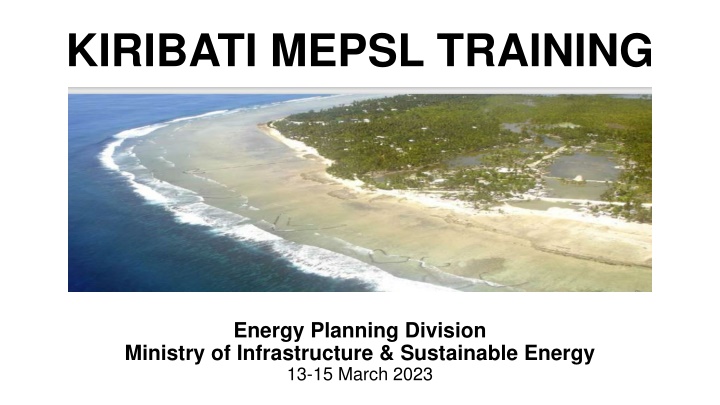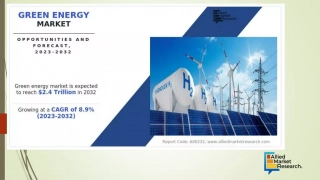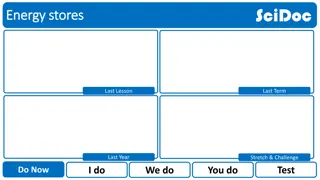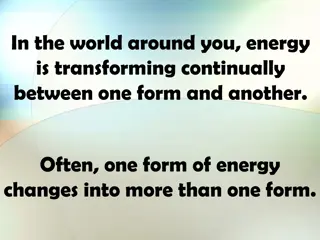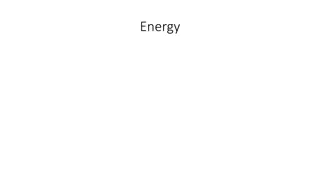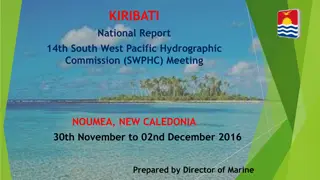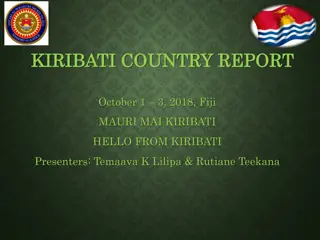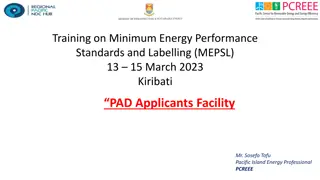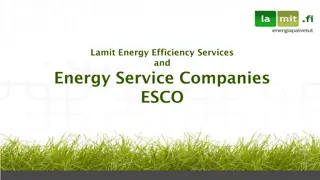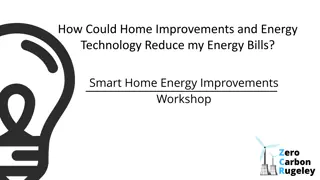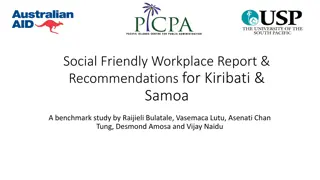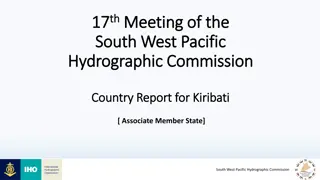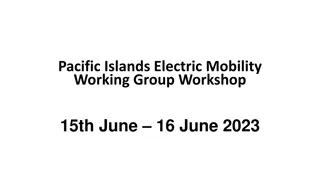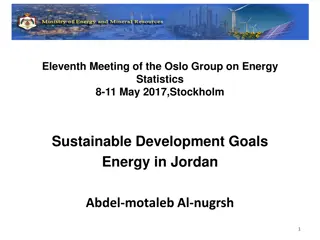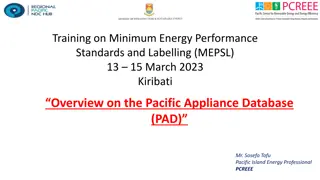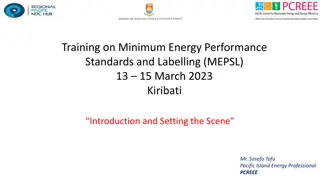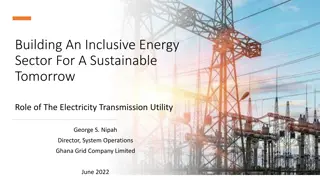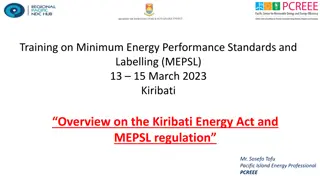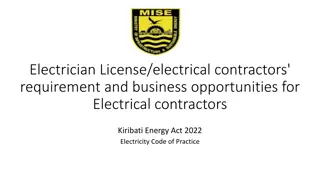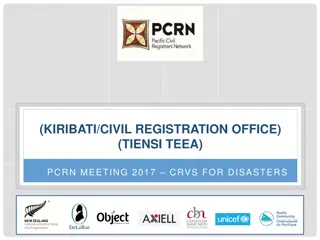KIRIBATI MEPSL Training: Energy Sector Overview & Act 2022
The KIRIBATI MEPSL Training presents insights on the energy sector, policies, Energy Act 2022 (MEPS), and future strategies. It aims to modernize regulations, set performance standards, and enhance private sector participation in sustainable energy developments. Learn about key targets, framework, and mechanisms for the effective oversight of energy services.
Uploaded on Mar 14, 2025 | 4 Views
Download Presentation

Please find below an Image/Link to download the presentation.
The content on the website is provided AS IS for your information and personal use only. It may not be sold, licensed, or shared on other websites without obtaining consent from the author.If you encounter any issues during the download, it is possible that the publisher has removed the file from their server.
You are allowed to download the files provided on this website for personal or commercial use, subject to the condition that they are used lawfully. All files are the property of their respective owners.
The content on the website is provided AS IS for your information and personal use only. It may not be sold, licensed, or shared on other websites without obtaining consent from the author.
E N D
Presentation Transcript
KIRIBATI MEPSL TRAINING Energy Planning Division Ministry of Infrastructure & Sustainable Energy 13-15 March 2023
Presentation Outline 1. Energy Sector Overview 2. Energy Policies and Frameworks 3. Energy Act 2022 - MEPS 4. Major Benefits 5. Way Forward
1. Energy Sector Overview KOIL MISE PUB Energy Planning Division KGES MLPID PRIVATE SECTOR
2. Energy Policies & Frameworks Important Energy Targets: 1. SDG 7 by 2030 2. NDC by 2025 3. Fossil fuel use reduction by 2025 South Tarawa 45% (23% RE, 22% EE) Kiritimati 60% (40% RE, 20% EE) Outer Islands > 60% RE for public infrastructures 100% RE for public and private institutions
3. Energy Act 2022 1. Development commenced in 2019 2. Endorsed in Dec 2022 3. Assented in Feb 2023 4. Contents: 12 - Parts (Part VIII MEPS) 101 - Sections 4 - Schedules
Purposes Modernize the legal and regulatory framework and institutional structure of energy sector Establish Minimum Energy Performance Standards (MEPS) Establish a legislative and regulatory environment for private sector participation in the energy sector Establish effective oversight, monitoring and regulatory mechanisms over the energy services and energy service providers
Part VIII - MEPS Minimum Energy Performance Standard (MEPS) A standard that set a performance requirements for a device that consume less in performing a specified task. Energy Performance Labelling and Testing (EPLT) Regulations regulate the importation of Electrical Appliances restrict appliances that do not meet a MEPS How to import? Register the brand and model of electrical products To be issued with a certificate only if comply with EPLT regulations Cancellation of registration if: Electrical product does not meet MEPS Energy labels affixed to products are incorrect Person who does the registration fail to comply or provide false information etc Seizure of imported electrical product if: not registered, no certificate granted by EPD and a product does not meet MEPS
Part VIII - MEPS (Cont) Owner/importer has 14 days to justify for the product not to be seized or the products will be destroyed at own cost (EPD to issue the destruction certificate) or re-exports the products at own cost No one is allowed to sell nor let for hire a product unless such has been registered and a certificate has been issued EPD s function Prepare and issue EPLT regulations Keep and maintain the register of persons and electrical products Assess applications and issue certificate Monitor and enforce compliance through authorized officers (EPD Officer and Customs Officer) Educate the public on the economic and environmental benefits
Part VIII - MEPS (Cont) Powers of authorized officers To investigate, enter for inspection, take copies or extracts of any documents needed for performing their functions Owner/importer of electrical products May make complaint in writing to EPD Must lodge (if requested by EPD) before or on the date, an annual return Must not disclose any information unless required by EPD for prosecution purposes and for performing functions Commits offence if they knowingly or intentionally fail to comply and is liable on conviction as per section 62(2-3) and EPD may serve a penalty notice (s.63) May appeal to the Minister (within 28 days of decision received from EPD) if not satisfies with EPD s decision. Minister may confirm, vary, revoke or make any other order May appeal to the Court if still not satisfies with the Minister s decision
Part XII - Miscellaneous 1. If the product is in one s possession at the time of the commencement of the EPLT regulation Register if the product meet the standards Notify on the brand and model and the number of units in possession if the product does not meet the standards 2. If the product has been ordered but has not been imported at the time of the commencement of the EPLT regulation and the product does meet the standards. Register within 6 months from the commencement of the EPLT regulation on the brand model and the number of units 3. On or after the commencement of the EPLT regulation a person must not order for import a product that does not meet the standards 4. After 3 years of the commencement of the EPLT regulation a person must not sell, hire or offer for hire purchase a product that does not meet the standards 5. Despite the above (no. 4), an individual person or charitable organisation, after 6 months from the commencement must not import a product for personal use or other purposes including a charitable purpose 6. Within 14 days of a written request from EPD, a person must provide evidence to verify the date on which an order for a product intended for importation was placed
Schedule 4 - Regulations Section 2(d) EPLT Regulation To establish a system of application for registration and certification of brands and models that meet specified minimum energy performance standards labelling and testing standards that: Prescribes the system, rules and standards required in Part VIII Specify the offence as stated in Part VIII Prescribe different amounts of penalties for different offences or classes of offences Any other matters required or necessary for the carrying out, performance and enforcements of the EPLT regulation
4. Major Benefits of MEPS Providing EPD with legal mandate to coordinate, improve sector performance and promote EE Encouraging and cooperation with private sector for participation in the energy sector Banning inefficient electrical appliances through EPLT Regulations Achieving national, regional and global RE and EE targets through the private sector participation in the energy sector and through EE initiatives
5. Way Forward Finalization of EPLT Regulation (with PCREEE and OAG supports June 2023) Getting Cabinet s endorsement on this EPLT Regulation Development of application form and registration form Development of certificate (for importing & destruction) Appropriate tools and training for: authorized officers and customs officers for enforcement purposes importers for compliance purposes Awareness programs Enforcement
Acknowledgement NDC-Hup and SPC PCREEE Government Ministries and SOEs Private sector representatives
